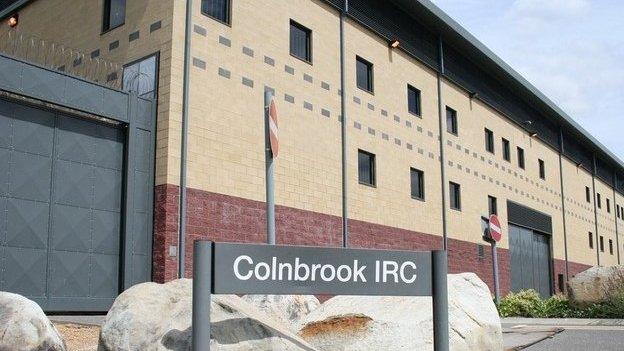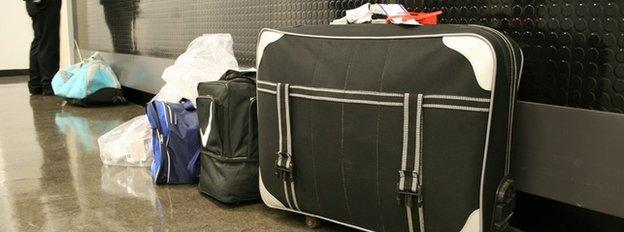Fast-track asylum system 'unlawful', High Court rules
- Published

Colnbrook is one of the immigration removal centres where asylum seekers are detained
The future of a key part of the government's system to remove failed asylum seekers is in doubt after the High Court ruled it was unlawful.
Mr Justice Nicol said the Home Office's system to "fast track" certain cases contained "structural unfairness".
The process accelerates legal hearings and appeals, while keeping the individual detained at all times.
The government said it was disappointed by the judgment and would be appealing.
'Serious disadvantage'
The judge said that despite a number of safeguards, applicants were not able to properly prepare their cases and their lawyers were also put in an unfair position.
Ruling on a case brought by campaign group Detention Action, the judge said: "In my judgment the Fast Track Rules (FTR) do incorporate structural unfairness. They put the appellant at a serious procedural disadvantage.
"The appellant is always detained and, as is obvious, the fact of detention places additional obstacles in the way of achieving all that has to be done before a tribunal hearing.

Analysis

By Dominic Casciani, BBC home affairs correspondent
Fast-track removals were introduced more than a decade ago because the then government believed too many people were abusing the system.
But critics have long said the speed of the procedure is manifestly unfair, not least to individuals who may have complex but genuine claims for protection.
Mr Justice Nicol has put a stay on his judgement, and that means that the fast-track system remains in operation and asylum seekers within it can still be removed.
But if the government loses the eventual appeal, it could deal a major blow to an important part of the removal system.
There have been previous judgements against parts of the system - but this one is more important because the court said it was wrong that ministers could impose time limits, rather than giving discretion to tribunals. That's something which the judge said looked like sacrificing fairness "on the altar of speed and convenience".

"What seems to me to make the FTR structurally unfair is the serious procedural disadvantage which comes from the abbreviated timetable and curtailed case management powers."
During the case, the government had argued that the system was fair because asylum seekers could ask for a 10-day adjournment before a final decision.
But the judge said the power to adjourn had a "very limited role" in ensuring a just outcome.
"Therefore I find that the claimant's challenge to the legality of the Fast Track Rules succeeds," the judge concluded.
Although Mr Justice Nicol has ruled the system illegal, he has put a temporary delay on his judgement coming into force to allow the government time to consider an appeal.
'Speed and effectiveness'
The Detained Fast Track system plays a key role in immigration removals and can lead to someone leaving the country in about 22 days.
The system was created in 2003, and was applied to 4,300 asylum seekers in 2013.
Reacting to the judgement, Detention Action director Jerome Phelps said: "We are pleased that the Fast Track appeals process has been found not just unlawful but ultra vires [beyond the government's powers].
"But we are shocked and disappointed that a stay has been granted, given that this is an area of law requiring the highest standards of justice and fairness.
"By granting the stay, it appears that the judge considers that the severe potential consequences to asylum seekers, including removal in breach of the Refugee Convention, are outweighed by the inconvenience to the Home Office and Lord Chancellor of suspending the process."
The Refugee Council welcomed the ruling, with chief executive Maurice Wren saying: "Today the courts have recognised the detained fast track appeals system for what it is: fundamentally unfair and a grotesque caricature of British justice.
"This is an important step forward in the battle to stop government officials arbitrarily and shamefully imprisoning some of the world's most desperate people who have simply asked for our protection."
The government says Detained Fast Track is an important part of the UK's immigration system.
A spokesman said: "It contributes significantly to the speed and effectiveness with which asylum cases are processed - including swiftly removing those found not to be in need of protection - and saves the taxpayer money."
- Published26 July 2010
